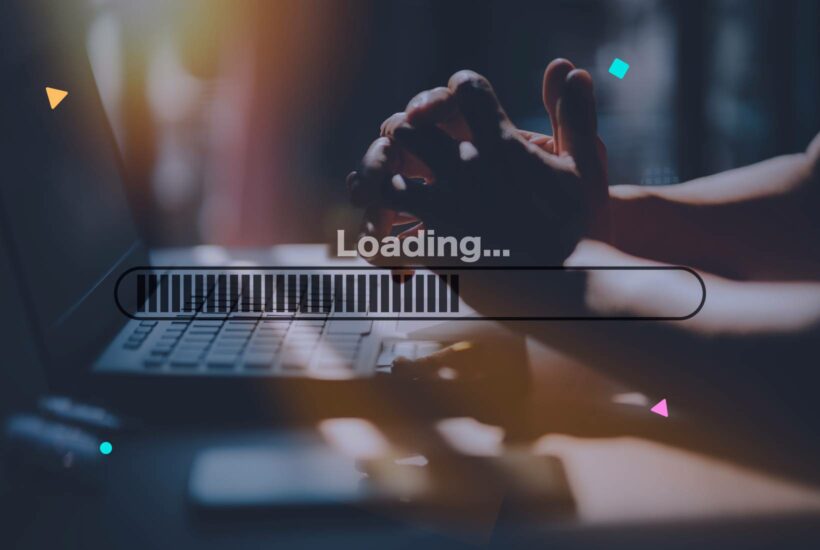10 reasons why your WordPress is slow and how to fix it

If you have noticed that your WordPress website is loading slowly, it is very likely that this is associated with a loss of traffic, conversions and search engine rankings. That’s how important loading speed is.
Why is this important? Because the user experience is negatively affected when we have to wait for a website to load the content we want to consult.
According to Google, if your website takes more than 3 seconds to load on mobile devices, more than 53% of users will leave before waiting that long. It’s really crazy.
If you’re here it’s because you probably don’t know why your website loads so slowly, so we’re going to explain some of the most common causes and possible solutions.
Come with me!
Tabla de contenidos
Too many plugins installed
Every plugin you install on your WordPress site adds additional code that must be loaded every time someone visits your site so if you have too many plugins your website will inevitably be slower…
This is probably the most common reason or the one I’ve encountered the most. WordPress websites with 40, 60 or even 80 plugins. Some even do exactly the same functionality. When with far less than half of them they could achieve the same result in a much more optimized way.
To fix this, try disabling or removing plugins that you are not using or that are not essential to your site or look for other, lighter alternatives. I’m sure there are.
Unoptimised images
Large, heavy images can significantly slow down the loading time of your site as they are the largest files to load. But don’t worry, this is easily fixable.
Make sure you optimise images before uploading them to your site by reducing their size and weight without sacrificing quality considerably. And if you can, convert them to a new generation format such as webp, which is now supported by almost all browsers.
To help you with this process you can use an automatic image optimisation plugin like WP Smush, WebExpress or Imagify.
And if you want to go a step further, you can consider using a CDN to serve the static content of your website (such as images) much faster and anywhere in the world.
Inadequate web hosting
The server where your WordPress site is hosted can greatly affect the loading speed and is therefore one of the most important decisions in any web project.
If you are using a shared hosting with many sites or you have contracted a too cheap option, you may not have enough bandwidth or resources to handle the traffic of your site. And believe me, what you save on that hosting will end up costing you money in lost customers.
Choosing a cloud hosting, where your websites do not share resources with others on a single machine or server but on a set of them that are managed based on the needs of each site in real time is a good option.
In addition, nowadays it is essential that the servers where you host your website have modern technologies such as SSD disks, GZIP or Broly compression, PHP 8 and HTTP2.
Finally, keep in mind that if you use a server that is far away from your potential users, it will also be noticed as the information will have to travel more.
For all these reasons a good choice of hosting is one of the first things you should consider as a web professional.
Theme heavy
Some WordPress themes come with a lot of visual elements and functionalities that you don’t need and that can have a big impact on the performance of your website.
They load a lot of scripts, CSS code files that you are not using, WordPress admin customisations, etc….
So if you are using a theme that is not optimised for speed, consider switching to one that is and that suits the needs of your project or at least is lightweight and versatile so that you can configure it as you want.
Not optimised database
The database of your WordPress site stores all the information of posts, revisions, pages, comments, etc. …. That’s why it is advisable to clean it from time to time of unneeded stuff.
You can optimise the database manually or much easier by using a specialised plugin to do it automatically like WP Optimize with which you can even schedule database cleanups periodically.
Cache disabled
The cache stores a copy of your site in the server’s memory, allowing it to load faster the next time someone visits.
If you have caching disabled, every time someone visits your site, all the content has to be rebuilt from scratch, which can slow down load times.
Most hosting companies already have a server-wide hosting system but there are also WordPress plugins such as WP Rocket, LiteSpeed Cache or W3 Total Cache that are very good options for setting up a caching system.
Not optimised third-party scripts
.
If you are using third party scripts, such as social media widgets or traffic analysis, the website will take longer to load as it has to pull in content from several different sites.
Make sure you optimise these scripts to minimise their impact on speed and, if possible, do without them. In our experience few people pay any attention to them on a website and therefore they are quite dispensable.
Multimedia-enriched content
Rich media content, such as embedded video or audio, can be attractive to users, but it can also increase the loading time of your site.
Use these elements sparingly and be sure to optimise them to minimise their impact on speed. Techniques such as lazy loading can be very useful to avoid loading them until the user reaches that part of the page or post.
Not optimised code
This can be one of the main causes of a slow WordPress site, as it causes the server to take longer to process the request and generate the page.
There are several ways in which the code on a WordPress site can be unoptimised:
-
- Unnecessary code
-
- Unoptimised CSS and JavaScript files
Plugins like WP Rocket or LiteSpeed Cache mentioned above also help you with things like minifying and combining JS, CSS or HTML files.
This can reduce the file size and the number of requests to your site so that it loads faster for the user.
But beware, it can also cause the site to stop working or not look right as not all themes or plugins are well coded. So I recommend testing once these options have been activated so that your users are not surprised.
WordPress or plugins without updating
It is important to keep the version of WordPress and your plugins updated to take advantage of performance and security improvements and if you are using outdated versions, it can be one of the main causes of your website loading slowly.
With a tool like Modular, you can manage the updates of all your websites from one place to save a huge amount of time in the process.
And if you add to this the Uptime Monitor functionality to know if your website fails after an update and the automatic backup generation to be protected in any case, you have it all.
It sounds almost too good to be true but it is true. And if you don’t believe us you can try it for free and connect up to 10 WordPress websites by registering now at this link.
Conclusion
As we have seen, websites built with WordPress can be slow for a number of reasons, most of which are easily fixable.
Excessive plugins and lack of image optimisation, as well as inadequate web hosting are some of the most common problems. But they are not the only ones.
I hope that with this guide and the tips we have given you will be able to diagnose and fix the problems that are slowing down your WordPress site.


